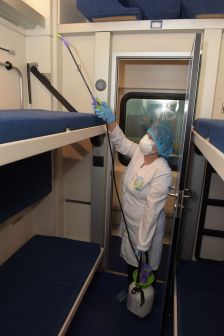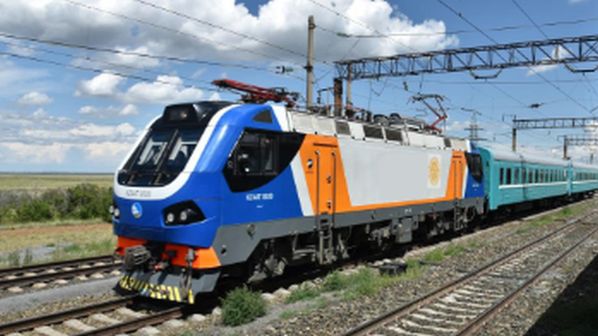KTZ stopped all passenger services on April 1 as part of the government’s measures to halt the spread of coronavirus, and passengers were reimbursed for tickets purchased. As a result, passenger turnover fell by 36% during the first four months of 2020 compared with the same period in 2019.

Ticket sales for domestic passenger services resumed on May 15 in preparation for reintroducing services on June 1, with disinfection of all trains prior to departure.
Fortunately, freight revenue for the first four months of 2020 showed a 2% increase, mainly due to a 32% increase in transit freight income.
To make matters worse, KTZ has been hit hard by the depreciation of the national currency, the Tenge. “The depreciation of the national currency in March of this year led to a negative financial result for the four months from the beginning of the year, mainly due to exchange rate losses from foreign currency debt,” says Mr Dair Kusherov, deputy chairman of the KTZ board for finance.
“On April 10, the KTZ Board approved the company’s adjusted budget for 2020, taking into account the influence of the coronavirus, changes in the national currency, and cost optimisation. For example, operating costs were reduced by Tenge 43bn ($US 104m) and financing of capital investments was optimised by Tenge 31bn.”
Kusherov says the state intends to provide “substantial support” and he assumes that the current level of subsidies will be maintained to cover wages and social contributions. In addition, to ensure the financial stability of KTZ’s passenger division, tenders for the procurement of services and materials, and rolling stock repairs will be postponed.
High currency risk
“As for the financial stability of the company, the main problem here is still the high currency risk,” Kusherov says. “At the end of the first quarter of 2020, the total debt of KTZ amounted to Tenge 1.85 trillion, of which hard currency debt was $US 1.7bn (Tenge 729bn at the current rate). Despite the fact that production indicators in the last year and in the first quarter have a positive trend, the financial result is negative. In March of this year alone, the foreign exchange loss of KTZ amounted to Tenge 109bn.
“Last year, early redemption of KTZ 2027 Eurobonds with a par value of $US 780m was made. This allowed us to reduce the share of debt in hard currency from 57% to 37% as of the end of 2019. However, for KTZ (with a currency gain of 24%), the currency risk remains very high. Already today the share of foreign currency debt rose to 40% due to the weakening of the Tenge in March this year.” Kusherov says KTZ and Samruk-Kazyna have developed a specific algorithm to avoid further exchange rate losses.
KTZ is also rationalising the group. Last year 12 non-core companies which were losing were more than Tenge 5bn per year, were withdrawn from the KTZ group. Two more non-core companies have been withdrawn since the beginning of 2020 and KTZ plans to withdraw another five non-core assets by the end of the year.

